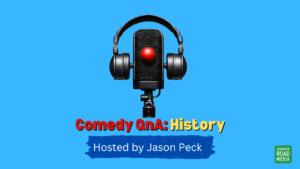I re-read a great book on public speaking recently and I was reminded of a technique which was the first one I ever used! I’ll give you a brief background on the book and the technique itself before I tell you about my experience with it.
The book I had read was called “Just Say Few Words” and it was by the late British Comedian and After Dinner Speaker Bob Monkhouse. Bob was a great comedian whose style were one-line jokes similar in style to his hero, Bob Hope. According to the book, Monkhouse was at an after dinner event in the 1960s alongside fellow British comedian Tony Hancock.
As the story goes Hancock never really enjoyed public speaking. He was in fact more of a comic actor than a comedian. He had brilliant script writers on his radio and TV shows and was more comfortable speaking the words of others.
According to Monkhouse they were both to speak at a charity function at London’s prestigious Savoy Hotel. Speaking before Hancock was a white-haired old priest, who nobody gave a second thought to.
Apparently, however, he gave an extremely witty and hilarious speech and made the audience roar with laughter.
Then came the deadpan genius that was Hancock. After the applause for Hancock had died down he waved his speech notes in his hand and said:
“Just before we came to dinner, Father Terry and I met in the gents and you all know what a lad he is for a joke, my goodness me yes. He said to me, “wouldn’t it be funny if we exchanged speeches and I did yours and you did mine?” So we did, and you’ve just heard mine. This is his and I’m not going to do this load of rubbish – good evening!”
I used this technique myself the second time I ever performed stand-up comedy. I was a 19 year old open mike new comedian at the time and, for reasons beyond me, I was put on after an extremely experienced feature comic who regularly played all the big London clubs and got paid for the privilege.
I sat there in the audience in horror as he made the audience scream with laughter. I was terrified because I knew I had to follow him.
I bounded onto the stage confident in my own abilities that I could follow such a pro. My world was suddenly blown apart as punchline after punchline plummeted; I was being heckled ruthlessly and I headed rapidly towards “comedy death”.
It was then I heard the words no dying young comedian wants to hear from a heckler: “got any material?” It’s a an old heckler cliche, but my heart sank. I’d been slaving over that script and those jokes for months.
I’d practised again and again and knew my carefully crafted material backwards. And here I was being asked by some drunken heckler if I actually had any material.
But, from the depths of my being, I managed to pull out a version of The Hancock Manoeuvre before I had even realised what I was saying. My immediate response was: “actually yeah. I spoke to comic who was just on before the show and we agreed to swap material. He did my act and was hilarious and I’m doing his and it’s a load of rubbish. Thank you very much, good night!”
I left the stage to a round of applause. More so than just a polite clap. I also received a huge compliment from the comic who had gone on before me.
So next time you are in a tight spot and the speaker before you does an absolutely amazing job, have a think to yourself “can I equal, if not better, that speech? or shall I invoke The Hancock Manoeuvre?” But I would only consider this technique if all else fails!
This article also appears at: Ezine Articles.




6 comments
2 pings
Skip to comment form
What a great fallback system. The more we have the better! Disaster prevention is great, in public speaking as anywhere, but having something prepared in case of disaster is vital as well!
Author
Hi Bronwyn,
Yes, like you said it’s a great fallback system. The danger is to use it as a way to “cop out” of doing a speech because you don’t think you can deliver the goods. I think it’s more of a last resort technique. In Hancock’s situation, as described in the article, he really felt that he couldn’t top the speech before him. But maybe he could’ve given it a go as he had a lot of kudos as a comic performer.
You’ve also reminded me of a speech that I saw last year, which I’m going to write a post on as a sort of follow up.
Cheers,
Jason
Hi Jason,
This reminded me of years ago when I was speaking at a lunch for retired businessmen. The conversation got around to after dinner speaking and one gentleman told me that when he was working, his firm booked the great Clement Freud for their annual corporate dinner. There were two speakers from the company due on first – and both barnstormed, really blew the roof off!
Everyone was thinking ‘How is Clement Freud going to follow this? We know he’s incredibly witty but he’s got such a quiet, laid-back style and this audience has been whipped up into a frenzy!’
Freud rose to his feet and said ‘Gentlemen, I always new when I accepted this booking that it would be a challenge so I thought I had better avail myself of the services of a firm which supplies really excellent, clever, funny speeches for people. They told me they couldn’t help as unfortunately they’d just sold the last two’.
Brilliant!
Nick
Author
Hi Nick,
I like it. Sounds very similar to what Hancock did, you’re right. I wonder if it would’ve been too much of a tall order for either Hancock of Freud to have given it a shot and actually delivered a speech…?
But perhaps, given who they were, it seems as though it would’ve been difficult for them to top the great speeches that preceeded them. We’ll never know.
And I guess, we would never have had these two great “escape routes” either. Thanks for the contribution.
Jase
Author
Ha – what a great title from Freud. I can see that working as a great opener. He was probably able to establish his authority and win them over right from the out set.
I’ll have to check out that book on after dinner speaking. If Hancock was receiving little or no money then it would make sense for him to bail out.
Thanks for your contributions, Nick. I really appreciate your insights on this one.
I would imagine that Sir Clement did actually deliver his speech. Not only would it have been a professional, contracted engagement but, if you read his excellent and very funny autobiography Freud Ego (brilliant title – so many meanings!), you’ll notice that he has never shirked a challenge.
The point is that his fallback line got him off to great start.
Celebrity after dinner speaking was different during Hancock’s era, as the interview with Terry-Thomas in Gerald McKnight’s The Compleat After Dinner Speaker demonstrates. Speeches were much shorter (just a few minutes) and often unpaid so Hancock could get away with leaving it at that!
Nick
[…] Amazing Public Speaking Skill – The Hancock Manoeuvre […]
[…] The thing is to notice that type of situation and “head them off at the pass”, find a way to re-gain their attention before it gets worse and they turn into hecklers. Perhaps the above mentioned speaker could’ve employed The Hancock Manoeuvre? […]